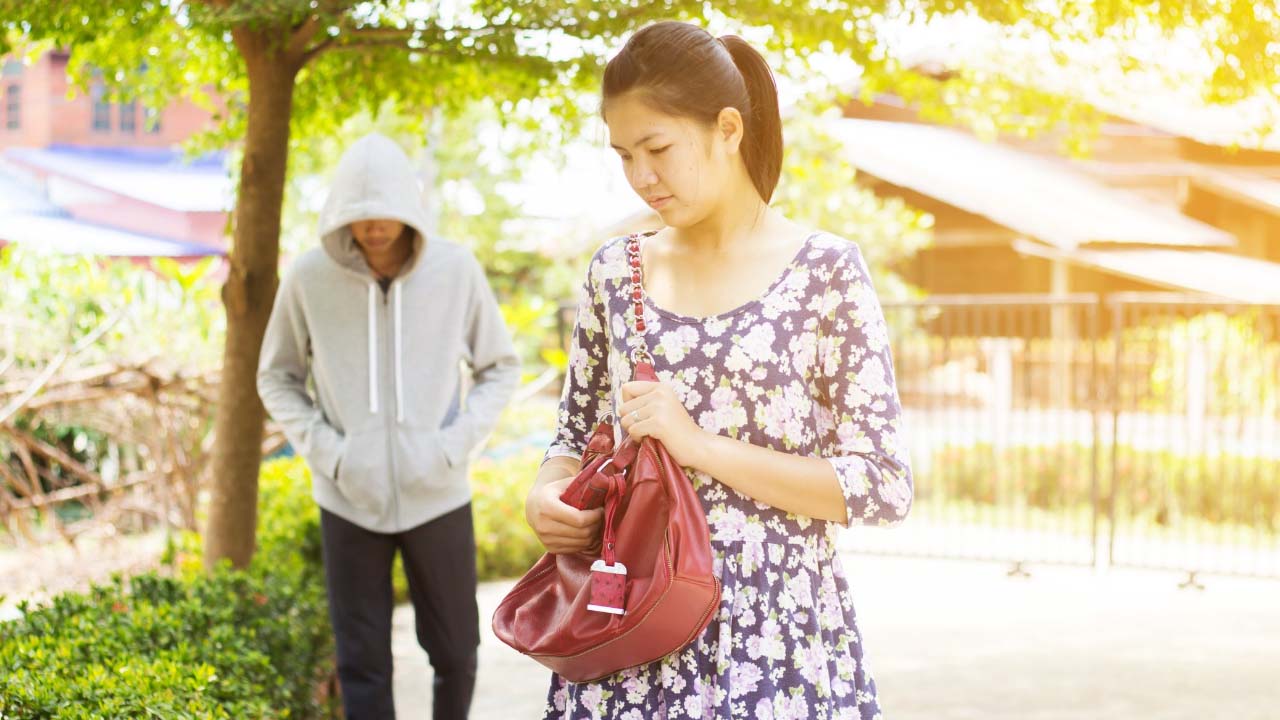
Safety in public spaces can be complex. There are things that you can do to be prepared and alert in all situations. Techniques can be used to distract someone long enough to escape, no matter the size of the attacker.
Today’s guest is Lieutenant Jessa Russell. Lieutenant Russell serves as the Community Relations Officer for Highland Park Department of Public Safety. In this role, she assists with crime prevention, safety education presentations, crime watch, community welfare concerns, and is the liaison to the Highland Park ISD. Lieutenant Russell began her career with Highland Park DPS in August 2008 and has served as a field training officer, defense tactics instructor, and operations supervisor.
“Some women are taught to be so submissive that they don’t realize they have power.” - Lieutenant Jessa Russell Share on XShow Notes:
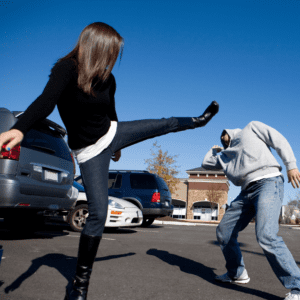
- [1:01] – Welcome to the podcast, Lieutenant Russell! Jessa explains how she got into law enforcement.
- [3:40] – Every department has different norms. Jessa describes the more common problems her department responds to.
- [5:10] – What is jugging? Jessa describes this crime and what to do to avoid it.
- [7:06] – There are more fire stations than police stations and if you are being followed, pulling into a fire station could cause them to stop.
- [9:01] – Always be skeptical. The world is a good place but there are bad people in it.
- [11:12] – Restaurants and bars are places to have a heightened situational awareness.
- [13:14] – If you are on a walk or run, only use one earbud.
- [14:51] – You have to be assertive. Political correctness will hamper you when safety is a concern.
- [16:30] – Park close to lights and the closer to the store the better. You can also request security officers or employees to escort you to the car.
- [17:49] – There are different mindsets regarding an attack.
- [19:12] – RAD is a program that Jessa educates through. It stands for Rape Aggression Defense. She explains the program and the training involved.
- [20:58] – Some women are taught to be so submissive that they don’t realize they have power, which can simply be your voice.
- [21:54] – Training does not mean you are a fighter. The techniques are designed to escape.
- [24:20] – Most attackers are known to the victims, but random attacks can happen as well.
- [25:28] – Assertively yelling “stay away” instead of screaming for help will catch someone’s attention more.
- [26:33] – Chris shares a story to demonstrate how bystanders may not know if the situation is serious.
- [28:47] – Jessa gives tips on how to help someone in danger.
- [29:50] – Noticing clothes is great, but noticing shoes is even better.
- [31:00] – Jessa explains what is important to note in describing an attacker.
- [34:18] – Remembering the first few characters of a license plate is often enough to help. Remembering all is very challenging.
- [36:50] – You need to know what to do if you are ever pulled over.
- [39:43] – If someone is trying to rape you and you are not fighting back, you are not at fault at all.
- [41:24] – Every department has a victim liaison.
- [43:18] – Don’t be afraid to report something and work with the police.
- [44:40] – Always lock doors and keep valuables in the house.
- [47:41] – Jessa discusses carrying a gun and the importance of knowing how to properly use it if you want to have it.
Thanks for joining us on Easy Prey. Be sure to subscribe to our podcast on iTunes and leave a nice review.
Links and Resources:
- Podcast Web Page
- Facebook Page
- whatismyipaddress.com
- Easy Prey on Instagram
- Easy Prey on Twitter
- Easy Prey on LinkedIn
- Easy Prey on YouTube
- Easy Prey on Pinterest
- RAD Systems Website
Transcript:
Can you give the audience a little background on who you are and how you got involved in law enforcement?
My name is Jessa Russell, as you said, and I work in Highland Park, Texas, which is a small agency near Dallas. I actually got involved with law enforcement because I was going to try to be a firefighter. Where I work, we're all firefighters and paramedics, and a friend told me about this department that was hiring and I'm always up for a challenge, so I decided to go ahead and do the interview. Honestly, I got lucky as a lot of people get in fire or police service, you have to try and try a lot of times. They accepted me, I took off, and loved being here.
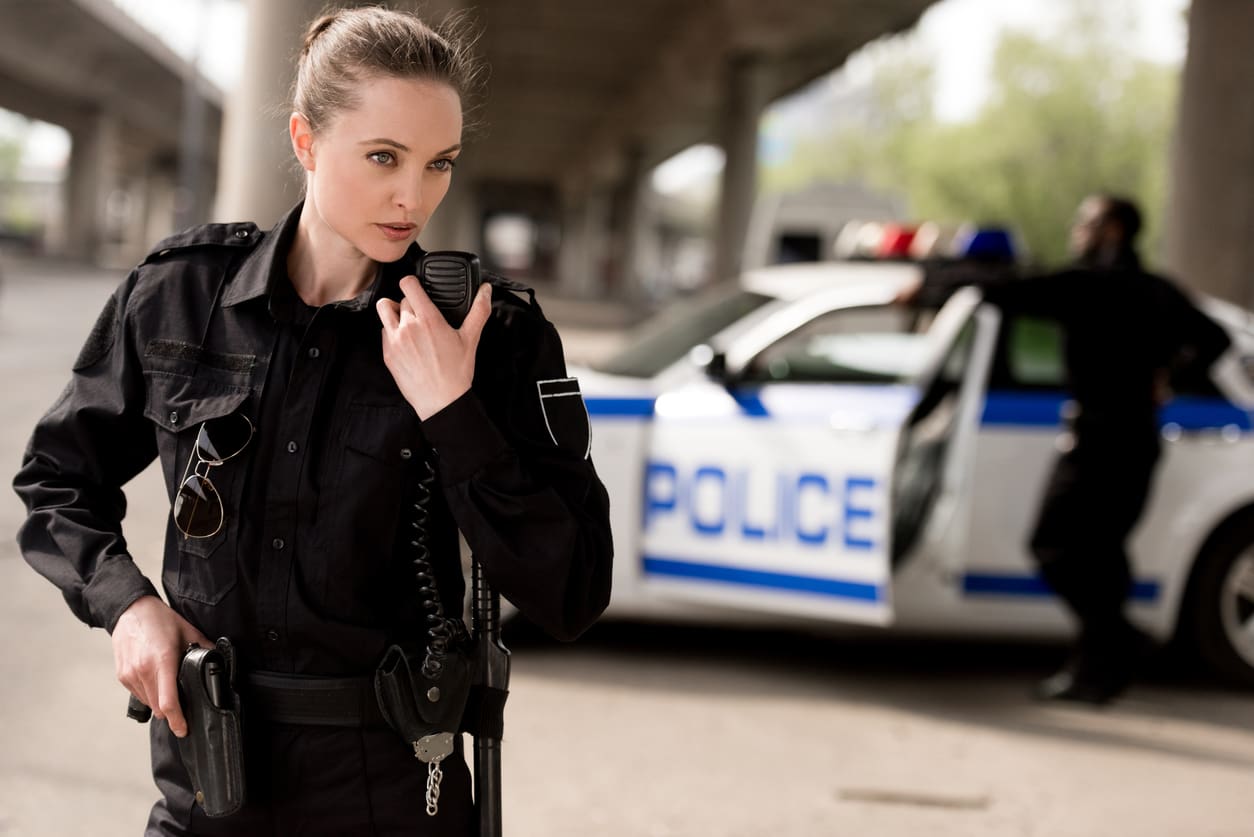 I've now been here 13 years, and when I originally started—a funny story—the chief brought me in when he hired me, and we're a small department so there's not a bunch of movement. He said, “What are your aspirations with regards, and do you want to be chief or do you want to be a supervisor?” At that time, I loved coaching so I liked being able to teach people things and I said, “If anything, I'll be an FTO, maybe. But I don't have any desire to take on all the leadership roles.” He's like, “OK, that's good.” Eleven years later, I'm a lieutenant.
I've now been here 13 years, and when I originally started—a funny story—the chief brought me in when he hired me, and we're a small department so there's not a bunch of movement. He said, “What are your aspirations with regards, and do you want to be chief or do you want to be a supervisor?” At that time, I loved coaching so I liked being able to teach people things and I said, “If anything, I'll be an FTO, maybe. But I don't have any desire to take on all the leadership roles.” He's like, “OK, that's good.” Eleven years later, I'm a lieutenant.
It's definitely one of those I've definitely learned to keep yourself prepared for what's to come and always be trying to excel. In that way, if an opportunity arises and you want to go for it, then you're prepared to do that.
Was that the point where you decided to go into Public Information and Community Relations?
That was another one of those where the opportunity arose, and I like to challenge myself, and I want to learn new things. I went for it and now that's where I am for the past about four months, and now I'm the Community Relations Officer/Public Information Officer.
It's a different ballgame than actually going, and answering the calls, and showing up to people's emergencies. Now, I'm at the backend and making sure that people, one, know about them, and two, how do we help alleviate them from occurring if possible. I get a lot of educational role items.
Let's talk about what are the common things that in situations people get themselves in, what ways they could have gotten themselves out of it even before it happened, and what happens after they do get themselves in a situation?
I think every agency has a little bit different norms. Some agencies have a lot more of their violence come from domestic violence. It comes from domestic violence being spouse and husband, or just family in general. With our agency, it's more outsiders that come to town and try to steal something, or it's people that get drunk.
My number one thing is if you're going to drink alcohol, probably pay attention to your emotion before you start drinking because most people, whatever their emotion is before they start drinking, it just escalates. My other suggestion is when you're with somebody and it's one of those where you can see the escalation is going, try to do a de-escalation of, “Hey, maybe we should slow down, or maybe I'm ready to go home,” and whatnot.
If they're not having it, then sometimes, unfortunately, that person is not your responsibility or maybe you need to call another resource to help deal with that before the fight happens. That's hard, especially if both people are drinking. Emotions are hard whether you're sober or drunk.
The alcohol doesn't help.
No. The other incidents where people get themselves in trouble is—have you heard of jugging? In Texas—I don't know if you have the same…
I think the terminology is vaguely familiar, but let's pretend I don't know what that means.
OK. In Texas, at least, jugging is referred to when someone is going to the bank. A lot of times, especially if they are owners of a business or part of the business, they'll take out a large amount of money. If they do a lot of contract work, sometimes they'll get cash paychecks.
What happens is somebody is on the lookout for these people and they pay attention to the owner inside the store or inside the bank, they walk out, they follow them in the car wherever they go. That person gets out at their next stop and, sure enough, they come back and their window is smashed. Whatever bag they have, they pay attention that they know where you put that bag. Typically, they can almost go within seconds, they’re paying attention to where you seem stuck in it.
Any time you’re getting a large sum of money, pay attention to when you’re leaving. Is somebody eyeballing you? -Jessa Russell Share on XDoes someone enter and exit around the same time? Then, obviously, once you get in your car, if you notice the same car taking all the same turns as you, call 911, let them know. Just change your route and that will make it where you can be even more suspicious.
If all of a sudden you're going north and you decide, “Nope, I'm going to turn and go south,” and they go south with you, that's not the norm. That's one thing, at least in our city, we've seen lately.
Is that the sort of thing where you recommend the person just drive to the police station if you think you're being followed?
If there's one local, yes. If there's not one that's local, then definitely call 911. A lot of times, there's at least a fire station closer. There are more fire stations around than police stations. Not that the firefighters are going to come out and have a gun to help save you or anything like that, but a lot of times, just a public place helps scare people away.
Don't get out of your car. If you stop and they stop behind you, then decide, I can't say every situation is the same, but obviously, maybe you want to keep driving then and just keep on the line with 911 and let them know where you're going. There's never an exact right answer for any of these situations.
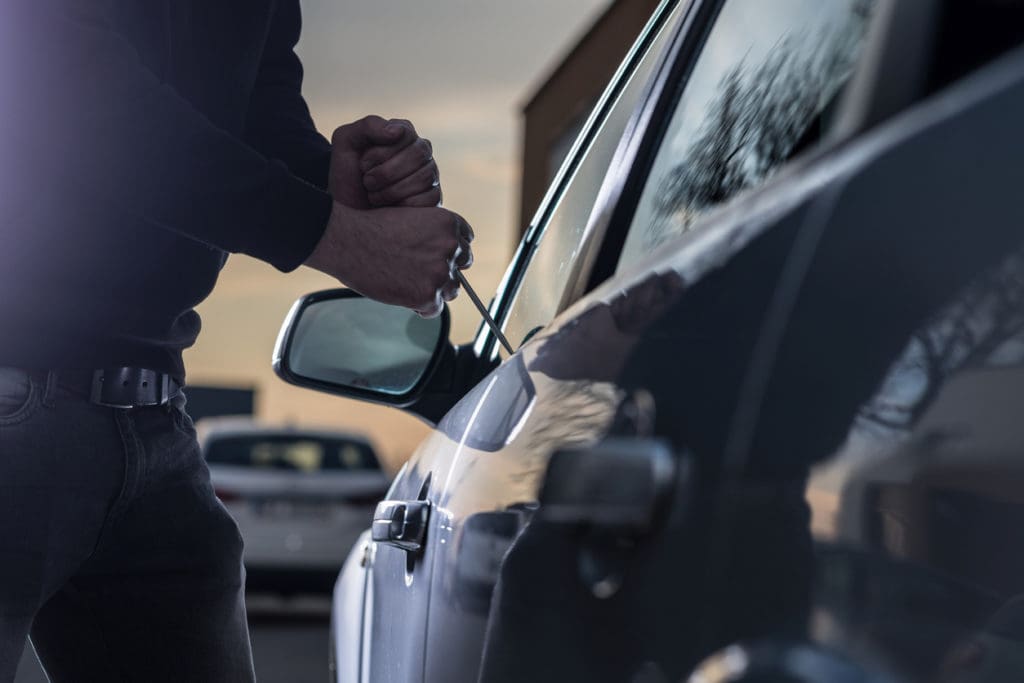
The hope is to identify it before either you get jumped or before they break into your car and try to mitigate the issue. Watching out for that person who’s lingering in the parking lot outside the bank.
Yes. Typically, at least where we are, the incidents we found, they are doing this in a nonviolent way in the sense that they're not typically running up and trying to actually assault the person. They literally just want the quick cash and the smash-and-grab type thing.
More opportunistic.
Yes.
I know we see that out where I am or where people are coming out of high-end shopping malls.
That was going to be my next thing especially with Thanksgiving, Christmas, all that stuff coming up. They tend to figure out if you got a bunch of bags, especially if you're coming from a high-end shopping center. Again, it's all about paying attention to what's around you and having the concept that you have to have some Spidey senses.
The world is, overall, a good place, and I think that’s a positive attitude. I never want to lose that. -Jessa Russell Share on XWhat's funny is I'm an officer now and I still have a little bit—you’ll never get rid of it from me—but the world is, overall, a good place, and I think that's a positive attitude. I never want to lose that .But at the same time, you need to have a little bit of skepticism that the world is a good place, but there are bad people in it.
With coming out of the shopping malls, I know some people can only carry so much stuff at once. They come to the car, drop stuff off, and go back inside. To me, you've just told the person who's watching you, I'm going to be gone for another hour shopping. Should you move your car to a different parking spot or the other side of the mall?
That's a really good idea. Again, it's going to be situational. Do you truly see somebody out there that seems to be lingering and the biggest benefit to you doing that is you can see, “Is someone trying to follow me?”
If you are paying attention and somebody is walking behind you as you go to your car, they keep on walking, and you notice they don't seem to be going to the car. You can typically tell if someone has an aimless walk, then for sure, I would move my car. Then I would even contemplate, “Maybe I should come back for another trip another day.” Because even just moving your car, if they're really that savvy, they'll probably see where you go and then just realize your car is somewhere else.
Particularly if it's a smaller mall where you can see the entire parking lot from one spot.
Yes. But I love the thought.
Where I am, there's a big mall where it probably would take you half an hour to walk around the outside parking lot so you can easily go to the other side of the building and no one would notice.
That makes sense. I don't have a big shopping mall that I go to like that.
There's something positive to be said for small communities. The family feel that you don't get in major metropolitan areas. What are some of the other places where people need to have that situational awareness?
Definitely bars. Not just because of drugs, but just in general. Restaurant bars, that type of thing. So many times women put their purse on the back of their chair without any regard to the fact that, especially in a busy place, you don't even have to have your purse stolen. A lot of times people just reach in there and grab your wallet, which is typically your main focus to keep.
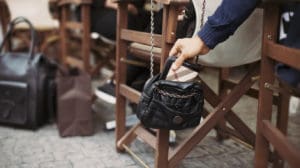 I don't recommend hanging them at the back of your bar stools. Put it in your lap. Sometimes I'll put mine under the table in between my legs. Partly I do that because if it's between my legs, I'm not going to walk off without it because I will feel it when I get up.
I don't recommend hanging them at the back of your bar stools. Put it in your lap. Sometimes I'll put mine under the table in between my legs. Partly I do that because if it's between my legs, I'm not going to walk off without it because I will feel it when I get up.
I'm even as far as if I'm going to the bathroom, I'll let the party that I am with, I'll say, “Hey, my purse is wherever I put it,” and I'll make sure they keep an eye on it too. Especially if they didn't bring it in, even if you're with a bunch of women, you get your own little world and you've got your stuff. You might not pay attention.
Depending on where you are, I'd imagine for you guys just walking along the beach, you all have your paths that I would imagine, I'm not sure. But knowing where we are, just people walking out of walks lately had their cellphones stolen from them and they're just in neighborhoods going for a walk. Somebody comes behind them, rips their cell phone from their hands, and takes off.
Just when you're out and about in public, unfortunately in this day and age, you really do have to again be aware of your surroundings. I don't run or work out with headphones or music. I like to zone out on my own but always use just one earbud if you're going to be working out or just going for a walk. If you can, even with your cell phone, if you can keep it in your pocket where it's not such easy access, I would do that.
You really have to be aware of your surroundings. Use one earbud if you’re working out or going for a walk. -Jessa Russell Share on XAgain, it's one of those thoughts about, “Have I seen this person walk past me a few times? Is that normal?” Maybe you're in a strip mall that's kind of normal where they have different stores they’re going to, who knows. But if you're in the middle of a walk in the neighborhood or along the beach and they walk past you, three or a few times, they might not be normal.
Everyone has Spidey senses and, especially for women, I like to say to make sure you pay attention to those Spidey senses. Don't deflect them because you're trying to be that nice person. I teach a class for women that's directly related to self-defense. It's a lot of situational things and then you do a hands-on how to actually punch and just some distraction techniques.
Everyone has Spidey senses—especially women. Don’t deflect them because you’re trying to be that nice person. -Jessa Russell Share on XThere was one lady I spoke to and she was talking about how a homeless person kept bothering her about giving her some change. He wanted her to give him change. She said, “No, no. I don't have any. Thank you.”
He kept following her and he ended up eventually reaching out and grabbing her hand and trying to pull her. “I know you have money, give me some money,” because she was dressed really nicely. Even then she said, “Sir, please leave me alone. I don't have money.” And just very, very polite. I was like at one point, you’re going to have to decide for yourself, but you’re going to have to be assertive. You don't have to be mean. No one has the right to come up and touch you or grab you no matter what the incident is going on.
Political correctness is sometimes going to hamper you if that's what you care about more than what you care about your safety. I always try to tell the women when I am teaching that class—it’s called RAD. When I teach it, I tell them that you are going to be assertive and you get to be the one that's comfortable. If you make someone else uncomfortable because you're treating them “poorly”or “meanly” then that's going to be their problem. If you're going home safe, then that's OK. Again, that's in parameters. You're not going to accost somebody just because they whistled at you or something.
There's an appropriate response.
Yes.
We'll come back and talk a little bit more about the program that you are a part of. Any particular things about parking structures? To me, I've always heard people say, Always have your keys in your hand.” My wife is one of those who before she gets in her car, she always walks around the car, looking at the back seat before she gets in the car. Before she opens the door, she always checks to make sure that the car is empty. Are there any parking structures, parking lot tips?
For sure, if you can park by lights, that's definitely recommended. The closer you are to the store, typically the better . A lot of places now, whether it's your business or if it's your store, a lot of places have security officers. If it is late at night or off-hours, then usually you can request that security officer to escort you to your car, even if you are just a shopping patron there.
If you can park by lights, that's definitely recommended. The closer you are to the store, typically the better. -Jessa Russell Share on XGranted that, again, I don't want to do this every time because partly you'll start freaking yourself out too much. But if there was something that happened that caused you to be like, “I don't feel right,” take advantage of those types of opportunities.
The whole keys in your hand, I don't oppose it as long as you know what to do. A lot of times, there's the element of surprise. When we train, we like to say, “If we are doing building searches, you're going to find somebody.” That's the mindset so that when you find somebody, you're not surprised.
If you're walking to your car and you're prepared for someone to jump out at you, then be prepared for someone to jump out at you. And when they jump out, you don't scream and cower. You yell. There's a difference between yelling and screaming. You yell, you hit them, and then you get away. There's a lot of mindset there.
Yes, because it wouldn't make sense to be carrying your keys, someone jumps out, you get startled then you drop the keys. Now you can't get to your car without stopping to get to the keys.
Yes. I love the fact that people are diligent enough to check their vehicle. It's not a common crime that people get in. If you leave your car unlocked, typically what's going to happen is if they get in, they're going to get in to steal something. They're typically not getting in to try to attack you later. But if you can have the sense of awareness to do that, there is no problem with that. I love it.
It only takes my wife two seconds to look.
Yeah, exactly.
It's a very low cost.
This is off-topic, but I would much rather people be that diligent in preparation when they leave their car to make sure that their kids are not in the car.
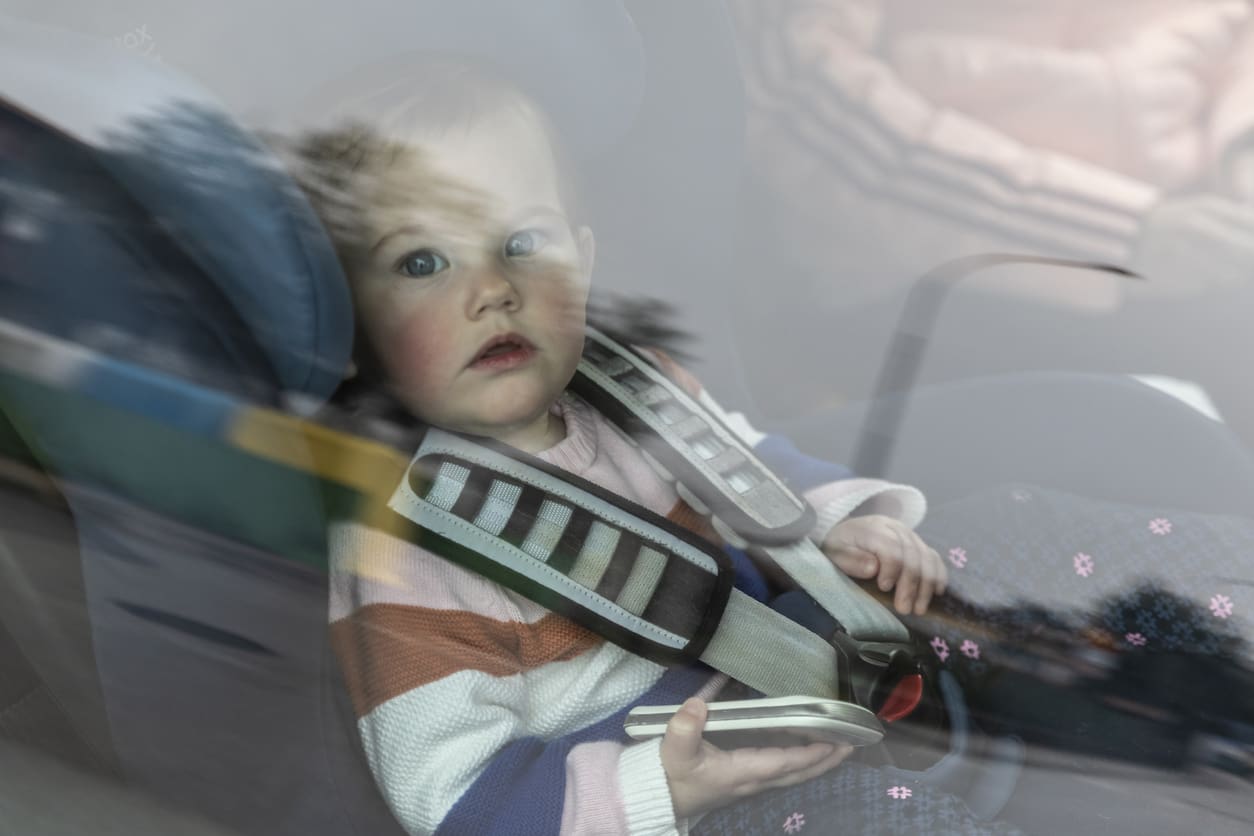
Yes, that's probably the most important.
That happens way more often.
Yes, unfortunately. In Texas when it’s hot, that’s not a good combination. Tell me more about the program that you teach?
RAD is called Rape Agression Defense program. Their website is rad-systems.com, and this program was started in Louisiana. It's taught all over the nation. I think they even have some programs all over the world, but most police departments and the police here in the south, we'll host these programs and typically they're free if it's done by the police department.
It's usually about a 12-hour course. Different departments will split it in different ways. We typically do three four-day classes, so we'll do one a week type of thing. The first day is the classroom portion. There's always paperwork. Then you also get into a lot of what we're talking about now—just understanding situational awareness. Understanding not putting your house key underneath a rock. That is common knowledge now that people do. Having drapes on your house.
If you're going to come home late at night, be prepared to leave lights on at your house, having the exterior lighting. All those types of things. When we talked about the parking garage, when you park somewhere, be prepared. If you know you're coming out late, find a place that's going to be underneath the light, stuff like that.
We do a lot of this on that first day. Then the next three days are going to be hands-on. You get two days of training where we teach you about punching, blocking, kicking. We're not teaching you to be an MMA fighter. You’re not going to get that in two days. But our goal is to teach you that one, especially when it comes to women, as I said with my previous story, some women are taught to be so submissive that they don't realize they have power. That a lot of times, most power comes from their voice.
Some women are taught to be so submissive that they don't realize they have power. Most power comes from their voice. -Jessa Russell Share on XAlong with teaching you how to punch somebody or how to block a strike is to use your voice and yell at them. As I said, you don't scream, “I'm a victim.” It’s you yell with an assertive voice, “Get back. Stay away.” Those types of things. That’s the first day of hands-on. It’s more punching, kicking, blocking. The second day of hands-on is what if someone gets so close to you that they’ve actually grabbed you? Especially if it's from behind, they’ve taken you by surprise. What are some techniques that you can do to get loose?
Again, this is not where you're going to be the jiu-jitsu master that can squiggle out and get them in an arm lock or anything. This is going to be—we call them distraction techniques. I'm going to take something of my body and strike them and get just enough loose that I can get away. That's the goal that we teach. The goal is to get away.
Is that the stomp-on-someone’s-foot maneuver?
Stomp on someone's foot, use the back of your head to head-butt them. Use your elbows, those are wonderful. Then the ones that always make people laugh is the grab and twist. If they leave your hands available down by their waistline, grab and twist. Even if it's a girl, if you punch up , that hurts. We teach about striking points. Obviously, the groin is a good one. The kneecap. The tops of the shins, if you scrape someone’s shin with the bottom of your foot, it does not feel good.
Kicking the shin: the only thing I’d be careful about—I don't recommend kicking with your toe. Use the bottom of your foot to kick their shin. Those are sensitive areas. If anything, right in the sternum area is always a good one. You can knock the breath out of people. This is called the palm heel. I don't really like to teach punching because it actually is easy to break your knuckles. Even experienced boxers break their knuckles because they just time it. People are moving and whether or not you're the best puncher, you timed it wrong, and you end up hurting your hand.
Kicking the shin: I don’t recommend kicking with your toe. Use the bottom of your foot to kick their shin. -Jessa Russell Share on XBut if you use your palm heel, it's a strong area. It’s bony enough that it saves you and it hurts them. I like to call the sternum area here. Also if you come right above the chin, that will hurt. Then, obviously, anybody knows, just getting them right on the square of the nose, it'll make tears come. Whether or not they really hurt that bad, they just naturally come.
It’s a natural response.
Yes. But that's some things that we’ll teach in those classes. We're not expecting you to beat them up. We want you to be able to distract them and make them be like, “Whoa. This person is fighting back.” Because most of the time, if you look at the victims that are just randomly chosen, which is just, FYI, that's not a common offense. It happens so we're preparing you for something that doesn't happen very often. Usually, someone that's going to attack you is someone that you know. Especially when it comes to a rape situation.
Yeah.
But the same techniques will work for them. Usually, if you're being attacked, it is because somebody thinks that you look weak or you look like an easy victim. Especially, like I said, those people that you have no relation to at all. That's usually what happens is they say, “This person is not paying attention. They look little. They look like they're just zoned out. They won't even see me coming.” When you strike them, there's an OODA loop process. They're thinking, “I'm going to grab this person. I'm going to do this to this person.” They have their steps.
Usually, if you're being attacked, it is because somebody thinks that you look weak or you look like an easy victim. -Jessa Russell Share on XYou pop them in the nose or you hit them in the sternum and knock the breath out of them, then they have to reprocess what they want to do next and while they're doing that, even though it's only seconds, it gives you a lot of times enough time to get away, hide behind something, and get a barrier of some sort. Yell, “Stay away from me.”
We try not to get people to yell “Help,” especially in the squeally voice. If you give someone an assertive voice and you're yelling at someone to stay away, get away, a lot of times that actually gets the attention of other adults in the area more often than a high-pitched squeal. One, a lot of people for whatever reason just don't pay attention to it. But two, a lot of times, especially if it is somewhat of an area where kids might be, they associate that with kid play. But everybody associates with someone talking in a stern, mean, assertive voice—not even mean—but an assertive voice that there's a problem over there.
Yeah. If I hear someone yelling, “Get away from me,” it's very clear to me, as the listener, that there’s something that happened that's very unwanted.
Yes. Like the story that you spoke about before we came on where at first you weren’t sure if they were playing or not.
Yeah.
I'm going to guess that that woman was not giving an assertive tone of, “Stop doing this,” right?
I’ll tell the story here for the listeners. My wife and I were picking up dinner. I saw this couple and it looked like they were roughhousing and laughing. No one was making a clear, definitive “Don't do this” or laughing. They’re jostling around a little bit. It wasn't clear that she didn't want to be there. It was really clear to me that was what was going. I didn't pay a ton of attention to it. Until it looked like he was yanking on her ponytail, which to me, that's out of bounds. This is not normal behavior. This is not kidding around anymore. We yelled at them and she went running. We followed her in the car and intervened there.
Let’s segue a little bit; we'll come back. We ended up calling law enforcement, calling 911. At that moment, there was a car associated with this couple. The police asked, “Is there a car involved?” I said, “Yes.” They asked, “Well, what kind of car it is.” “I don't know what it is.” It was iridescent. It was one of those cars—it’s Southern California, people put weird wraps on their cars out here. Depending on the light, it was blue, it was green, it was red. I said it was iridescent. The 911 operator said, “What?”
I realized it’s shiny. It's like shiny metal. It went on and ultimately, we intervened, someone else intervened. No one had to physically get involved. The law enforcement came out, separated them and addressed the situation. I don't know how it turned out. But it makes me wonder as a bystander or a witness to a situation, what should I be doing to aid law enforcement? What should I be doing to aid the person in the situation and not make things worse? But also, if the perpetrator runs away what should I be doing to help provide information to law enforcement other than to try to run them down with a car or something?
I like the idea of following them in the car. I mean, I don't want people to think when you say run them down—let’s not run people over. Unless you just saw them do something in a deadly force situation and you feel that that's what you have to do to make sure that doesn't happen again. But I do appreciate what you did for that female in terms of you followed them, you got your car, and you gave a barrier for that female so there was a barrier with your car between her and that other person. That's a wonderful thing.

Then, as hard as it is, it takes training, and so really focus on—especially if they're running away—what are they wearing? What’s unique is what shoes they have on. Because a lot of people that commit crimes, they’ll wear multiple clothing so that they can shed something and then they have a different clothing description on. In general, they'll just start stripping, and then when you find random clothing, as we trail somebody, that means they're going and finding clothes elsewhere.
Typically, people don't take their shoes off, though, and continue to run and hide. If you can figure out, especially if they're yellow or if they're plain white, it's one of those if you can give a description of shoes, a lot of times that actually helps more than just clothing. Hair length, facial hair, these types of features that aren't going to change within the next couple of hours, typically, that's always helpful. Hair color, then obviously any distinct tattoos. Again, those aren't going to change in the next few hours.
The build is always helpful and a lot of ways that most departments will describe that build is, are they slender? Are they average? Are they extra bulky in terms of muscularity? Most people, we don't want to prompt too much because you don't want to put words in someone's mouth and like, “Oh yeah, that's it.” It's just because you're feeding them stuff. A lot of times, we want a witness to be able to describe this without too much prompting, just to make sure that we don't accidentally prompt them the wrong way.
Think about if you were to describe them as tall and lanky, short and stout, things like that. Obviously, height is helpful. As much as people don't want to say it these days, race is important. It’s helpful for us to know if it was a black, white, Hispanic, Middle Eastern, because, again, that's not a feature that changes. When we have some people that we've asked and they're like, “They might have been Hispanic,” and a video shows up and it's very obvious, but they are worried to say that because they don't want to be perceived as racist.
When we're asking, there's nothing involved more than description. It would be easier if people said what color was their skin. Again, it's just that descriptive ability to be able to do a process of elimination if we see somebody walking down the street.
I’m trying to think, I don't remember if this happened in that conversation with law enforcement but let's say the TV shows, what’s their height and weight? I have no idea how tall someone is. I think if someone had asked me was he taller or shorter than the woman that he was interacting with? I know he was definitely taller than her or he was definitely shorter. Maybe in comparison to something else, height would work. I can't tell you the difference between someone who is 5’9”, and 5’10”, or 5’11” at a distance.
Yeah. We wouldn't be able to use that, per se. Now, it’s one of those where if there's a distinct difference, then it's easier. If they’re 6’2” versus someone that you can say is 5’7”, you can distinguish that. But, again, the average people are obviously the hardest to describe because, again, they're average.
That's when you get the best of, like I said, facial hair, clothing type, A.K.A. shoes are helpful, like I said. Did they have a weird limp when they ran? This is a lot of times—you’re in the moment and I get it. That's hard to really process. There's so much going on that your emotions and your adrenaline’s already up. 
But if you can process those, those are really helpful. If there was a car associated, can you try to get at least the first three letters of the license plate? I get it, we have seven, I don't know how many you guys have. But remembering all of them in a five-second span, that's usually pretty difficult.
I have to interrupt and tell a funny story. I was driving and came up on a light that was just turning yellow. It was downhill. I could very easily go through the intersection and I'll be at the very end of the yellow, but they had traffic cameras. I was like, “I don't want to risk it.” This whole thought process is taking half a second, whatever. I decide I'm going to err on the side of stopping. I stopped hard and the guy behind me chose the opposite plan. He accelerated into the back of my truck. It was a pretty good hit. I looked out the mirror and see his car was pretty banged up.
I don't want to have this discussion in the middle of the road so I kind of played off to the side. We go to the side, he drives past me and I thought, “This is a spot where there's no bicycle lane, there's no safe spot.” He was turning towards a parking lot. OK, we’ll just go to the parking lot. I'm good with that. We turned into the parking lot. He makes a U-turn, drives out and runs a red light, and drives away. I'm like, “Hit and run.” He had a personalized license plate.
Well, that’s helpful.
It’s like hit-and-run with a personalized license plate was not good because it was very easy to remember.
Yeah and distinct damage it sounds like. They’ll easily identify the car and be able to say, “Yeah.”
Yeah. They found him when someone else called 911 saying, “There's this kid in the car that is totally damaged. He’s leaking fluids and he's driven around the block six or seven times now.” He was scared. He didn't know what to do. Then he started to go home and realized, “Oh my gosh, the police are going to be waiting at my house. What do I do?” All over, $200 of damage to my truck.
It was one of those when you get your license, I know they go over this stuff but we need to reiterate a little bit. You need to know how to drive but you also need to know what to do in this situation. That brings up another safety aspect of what if you do get pulled over by an officer? Especially one of those that are the slick cars. I know for a while here, it was a couple of years ago, but we had an imposter that we were trying to catch because he had outfitted his—I can't remember the make of it now, but it was like a Dodge Charger-looking one.
I mean, we have police cars that look like that. He outfitted it with red and blue lights. If you ever are curious or you feel that you're being pulled over and it's not legit, then it is OK to call 911 while you're being pulled over. The nice thing about this day and age, most people have a cell phone. You can call 911 and say, “Is someone really pulling you over right now? This is where I am.” The dispatcher will be able to tell you if that's true or not just because whenever we pull someone over, we get on the radio, we tell them the location and we tell them the license plate of who we’re pulling over. That can give you some safety.
If you feel that you're being pulled over and it's not legit, then it is OK to call 911 while you're being pulled over. -Jessa Russell Share on XYou don't have to speed away. Don't do that because it could make that officer more suspicious. But put your flashers on, or at least drive a normal speed, start trying to get off to the side of the road, but you don't have to actually pull over if you don't feel safe. Now, granted, if it's miles long, that's going to be suspicious too.
But you should have been able to get somebody on the phone by then. Don't drive miles long and not be calling somebody. We've had incidents where that's gotten everybody in trouble because everyone’s suspicion goes up.
Yeah. I suppose if it's at night and you are stopping, just the good thing to do is to stop under a street light, even if it is a legitimate police officer, it just makes everybody happier, I assume.
Yes, and try not to stop on bridges, we don't like that. If we can, a lot of times, we’ll get on the loudspeaker and ask you to keep going, but at certain times, that doesn't really work either. But we would appreciate not stopping on bridges or if there's a street that's half a block or three blocks away that's a side street, turn off on that rather than being on whatever the main thoroughfare is. This is kind of going off track here, sorry.
That’s OK. I always worry when I see police officers on the road. I'm like, “This makes me really nervous. I don't want it.” No one should have to be doing that. Let's get back to it. Before we started recording, you're talking a little bit about if someone's attacked, we talked a little bit about this now, but distinctive features, smells, voice, sounds.
Another thing that we teach in that rape aggression defense course is that if you don't fight back, if someone is trying to rape you and you don't fight back, then you're not a terrible person. You did nothing wrong because there's, at times, if someone's holding a knife to your throat or threatening you where you feel like at any moment they could take your life, then yes, submit and do what you have to do to go home alive.
Then you take charge of this because you started paying attention to what you smell, what you see, those distinct tattoos, if they have missing teeth—all these types of things. If you can just, a lot of times, just out of normal reaction, you're going to grab and claw for at least a little bit.
If you get anything in your fingernails we can take that and try to match it with DNA. I'm not going to promise you it's going to be there. We're not truly like TV CSI. If this person is not in the system, it's not going to be there. It doesn't happen in 45 minutes. This is a long process. But the thing that we want people to understand is that at that moment you're the victim, but you don't have to be the victim forever. You can take charge and realize I can do something about this on the back end.
We want you to understand that this is not your fault. A lot of times, there are people that perceive if someone got raped, it's because they were asking for it, and that's totally wrong. People that get raped have—I can't think of one instance where it's their fault or they did something wrong. Obviously, that offender and that violator is the one that's wrong. You want to make sure you got home safe and then we want to make sure that we rebuild and get you back to being a confident person.
If you can give strong details to that investigator, then they can go back and work hard on putting this person in jail and making sure it doesn't happen again. Then on top of that—this is with any crime, whether it be assault or even like a DWI accident where you get hurt or anything—every department has a victim liaison. There's always going to be—typically they say you have to help with the investigation. But if you help with the investigation, most of them are free, there might be a small amount of cost but help for medical costs, psychological healthcare.
Even if there's a loss of property, a lot of times they'll cover whatever was damaged or stolen, those types of things. There are nonprofits that do this that aren’t even associated with the police department. The police departments will have those avenues to get you help. Don't be afraid to ask for that type of help. Don't be afraid to work with the police department. There are some people that don't report the crimes because they think there's no point. Again, they'll say, “It was kind of my fault.” Especially if it was a person they knew. They'll say, “I did this or that and I caused it.”
It doesn't matter, even if you truly were the cause, if you gave them the “Don't do this” and they stole from you or they hurt you in any way, they've committed a crime.
Yeah. That gives the person some power, I assume, to say, “No, I'm in charge. I'm going to come after you now” in a sense. Not vigilante come after you, but I'm going to do everything I can to provide law enforcement with everything that they need in order to bring justice.
Yes. One other thing that I know for our area is that it is really important to remind people and it sounds so basic, but just in general to protect yourself, make sure you lock your doors. This is obviously property for your car, but I know you hear it all the time, but lock your doors and put your stuff, if not in the house, at least not visible. Then I don't know about where you live but we have to remind people to actually lock their doors and lock the gates that go to their backyards and things like that.
We as police officers can't be everywhere at once. The more that you can protect yourself, the better off you're going to be. Typically, people don't come into someone's home to harm them physically, it's usually a property crime, but that still ends up emotionally harming someone. For some people, it's way worse than they would have thought, as weird as that sounds, but they feel completely violated knowing that the place where they're supposed to be the safest all of a sudden wasn't safe.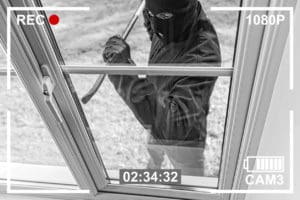
It's not the value of what was taken, it was the fact that someone came in and took it without them knowing about it. That’s the scarier thing.
Exactly.
Stuff can be replaced, but like you said, I mean, in my neighborhood of all the things that happen, I don't know of a single car that has been broken into, literally broken into where the person broke the window to get into the car to get something. All of them have been, “I think I left it unlocked. There was no window broken, yet stuff was gone.” That's probably the only way that happens.
Yeah.
I'm a tech guy, so I could think of a few ways that it would happen, otherwise, but in most cases, I think it's a matter of opportunity.
Yeah. While we're on that, don't leave your keyless ignition key in the car either, whether it's locked or unlocked. We've got quite a few vehicles stolen because of that. Be careful on that aspect.
Is it that the person has left the key fob in there with the door unlocked or that the person has broken the window and now I can just drive the car away?
It happens both ways. Most of the time, for us at least, the car is unlocked and the key is also in it, or a lot of times—and this is keyless or key)—they go into an unlocked house, find car keys, go open the garage, and drive the car away too.
The car keys that are on the hanger right next to the front door.
Yes.
Clearly labeled which car it’s for.
Yes.
Don’t keep the car keys right next to the front door.
There are so many things that you're like, “I can't do this and I can’t do that.” And again, we're not trying to make people think that everywhere is a terrible place. But there are bad people out there and we want to prepare ourselves to not be victimized by them.
There are bad people out there and we want to prepare ourselves to not be victimized by them. -Jessa Russell Share on XWe don't want to be easy prey.
Exactly, exactly. You put that in there, good job. One thing I want to bring up, because I get asked this a lot when I teach that self-defense class, is whether or not to own a gun because we're in Texas. People always think about owning a gun. I don't know how California is. But in Texas, obviously, you can go get a gun and now we just changed the law and you can open-carry a gun. But my thing is if you are not proficient with that gun and you're not completely comfortable with how you're carrying it and how to use it and when legally you're justified to use it, if you don't take the time to learn that, then you're better off learning some hands-on self-defense.
You don't have to go be, like I said, the jiu-jitsu master or MMA master. Just go do some basic techniques to learn and you're more than likely going to be better off, because a lot of times, someone has a gun and it ends up being taken from them either a) they don't store it properly so it's literally stolen, or b) they are in a situation where they feel like they need to bring it out, and because they're not comfortable with it and they're really like, “I really don't want to use it,” the person literally just comes up to them and takes that out of their hand, because they're shaking rather than doing what they're supposed to do. That's my recommendation on that.
That's good. I think that's probably a great place to close out our discussion today, and for one more time for the audience, what is the website of RAD Systems.
RAD is rad-systems.com.
OK. We’ll make sure to include that in the show notes. Thank you so much Lt. Russell for coming on the podcast today.
Thank you for having me.
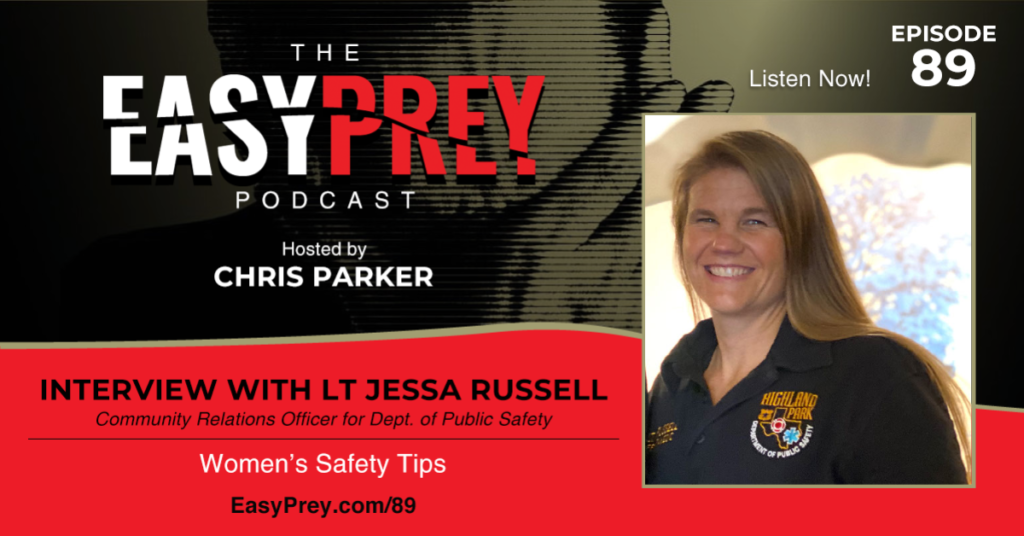

Leave a Reply